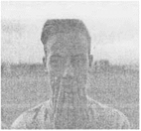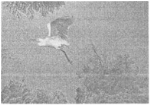-
阅读下面短文,掌握大意,然后从每题所给的A、B、C、D四个选项中选出最佳选项。
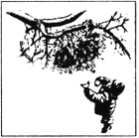
I stood under an apple tree, looking at the mistletoe hung from it. That was the same thing sold in stores for Christmas decorations. I had an idea—make some_________with the mistletoe. I wanted to buy a guitar for my brother, Derek.
I tried to jump as _________as I could, but the lowest mistletoe was meters beyond my reach. I had started home when_________caught my eyes.
At the edge of the apple orchard, some mistletoe lay by the tree, as if put there just _________me. I picked out the best mistletoe and rushed home _________.
When I entered the side door, I could hear my brother playing his guitar, which he used for many years. I walked to our_________and knocked at the door.
"Derek? Let me in."
"Hold on. Hold on," came a_________ reply. The door opened and my brother walked past me.
"Where are you going?" I asked.
"None of your business."
It wasn't easy _________that small bedroom with my brother. With Derek gone, I started to make the mistletoe into decorations. Derek's_________ guitar was beside me, wrapped in cloth. That guitar was the one thing in the world Derek__________. I knew what to buy him with the mistletoe money.
The next day I brought my mistletoe packages to school and__________every one. It was hardly enough to buy a guitar__________my pocket filled with change.
After school I went to the apple orchard again. Another__________waited for me. More mistletoe was there. When I took the mistletoe, I found the orchard owner standing under a tall tree. Some mistletoe fell from it. Then more and more. Soon a person dropped to the ground next to the owner. Derek! I __________in the shadows.
"Such hard work for you, "said the man," so what are you going to do with all the money I paid you?" asked the man.
Derek answered in a__________voice. "Saving up to buy my kid brother something for Christmas. He's been wanting a wooden recorder for years."
1.A.meals B.gifts C.furniture D.money
2.A.far B.high C.fast D.deep
3.A.something B.anything C.nothing D.everything
4.A.for B.against C.with D.around
5.A.calmly B.happily C.sadly D.angrily
6.A.living room B.kitchen C.study D.bedroom
7.A.nervous B.hopeless C.cold D.stupid
8.A.decorating B.sharing C.painting D.cleaning
9.A.old B.broken C.cheap D.ugly
10.A.talked about B.stared at C.looked for D.cared about
11.A.cut B.coloured C.sold D.checked
12.A.unless B.though C.if D.since
13.A.surprise B.problem C.decision D.danger
14.A.slept B.hid C.lay D.ran
15.A.curious B.humorous C.proud D.wise
难度: 困难查看答案及解析


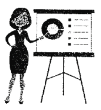

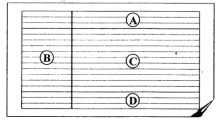
 B.
B. C.
C. D.
D.
